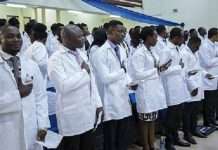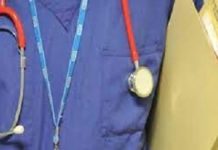
In this exclusive chat with Temitope Obayendo, Doctor Richard Oji, a family physician with the Oak Hospital in Ikorodu, Lagos, highlighted the significance of family physicians, while bemoaning the widespread ignorance about their crucial roles in the health care landscape. He equally urged all private hospital owners to enrol for the Diploma in Family Medicine programme for enhanced health care delivery. Excerpts:
Briefly tell us about yourself
I am Dr Richard Oji. I attended military primary and secondary schools before studying Medicine and Surgery at the University of Nigeria, Nsukka. I am currently a student of the National Postgraduate College of Medicine of Nigeria, Faculty of Family Medicine, where I am doing the Diploma in Family Medicine (DFM) programme.
Generally, I first practised clinical medicine in 2004. Practice has taken me from Enugu to Kaduna, Kano, Jigawa, Rivers, Delta and now Lagos State. I have been a senior medical officer and a deputy unit head in Accident and Emergency, General Surgery, Internal Medicine, Obstetrics & Gynaecology , ENT and was acting medical director in hospitals in Kaduna, chief medical officer in a mission hospital in Delta State, as well as an in-house surgeon in a reputable hospital here in Lagos. Presently, I am third on call in Oak Hospitals.
It is a common practice for people to refer to family physicians as general practitioners. Is this correct? If not, can you explain the difference between the two areas?
This is a very good question. General practice (GP) is a domain in family medicine, though I prefer the term “primary care.” It is just a fraction of what a family physician (FP) does. People confuse a family physician with a GP because of the nomenclature of the American College. Initially, FPs were referred to as GPs worldwide but as the specialty became clearer, many countries have corrected this error, Nigeria inclusive.
The MBBS makes you a “primordial germ cell”- which means that the sky is your limit. You can decide to be a physician, a gynaecologist, a paediatrician, a neurosurgeon, a cardiologist, a pathologist, a family physician, an urologist – you just name it! You are full of potentials, but you are not a finished product yet. To be referred to as a GP in the real sense of it, you need special postgraduate training. What most Nigerians refer to as GPs are actually pluripotent germ cell, but since that is what you are used to in this country, we stick to your terms for the sake of this interview.
A family physician is a multi-trained specialist that gives continuing and compassionate care to patients, undifferentiated by age, gender or presentation. We see illnesses and diseases in their very early forms and it requires sound clinical skills or expertise to diagnose these conditions. Several tools are used in our practice and we are advocates of George Engel’s Biopsychosocial/Einsteinean/Patient-Centred Model of medical practice. We are the patient’s guide through the ever confusing maze of health care. We recognise the role of the family in health and disease and try to treat the patient rather than the disease. A FP is a 5 or 6-star doctor: he is a care provider, decision maker, communicator, community leader, manager, and researcher.
Since general practitioners attend to all except infants, how practicable is it for general practitioners to avoid encroaching into the roles of family physicians?
By definition a GP attends to all patients and makes appropriate referrals. There is no rivalry between a GP and FP. In actual sense, the history of family medicine in Nigeria and worldwide is tied to general practice movement. We in Nigeria have the AGMPN to thank, which is an association of primarily GPs.
With the dearth of practising medical doctors in Nigeria, do you have an idea of how many family physicians there are in the country?
We are very few in number actually. Numerically, we are about 400 Fellows, a professor (Prof. Inem, the doyen of family medicine in Nigeria) and less than 2000 residents and DFM scholars. You see, we are a relatively new specialty.
From your experience so far, what would you identify as the most common health condition in the average Nigerian family?
Avoidable ailments like malaria, diarrhoea diseases, hypertension, diabetes, pneumonia, pregnancy-related ailments, somatoform disorders, and others.
What would you say about the popularity of herbs as alternative to conventional medicines?
This has increased the incidence of end stage renal diseases and liver failure. Also the rate of gastritis and perforated visci is higher.
What are the major challenges of family physicians both in private and government owned hospitals?
The gross ignorance, even within the medical field, about the role and position of the family physician. Primary care is in the hands of the wrong people. Even the WHO in 2008 advocated that FPs should to be given their pride of place. Some doctors still don’t see the FPs as consultants, and don’t appreciate the enormous workload they bear. Nigerians have lawyers, bankers, travel agents but don’t deem it fit to register with family physicians. Also, amongst doctors, the question of who owns a patient is still there.
In what ways could these challenges be resolved?
Our health policy should be modernised as obtained in advanced societies. There should be no question on the issue that the FP owns the patients and only sends collateral and interval referrals to these consultants who unfortunately hold on to these patients without courtesy of a feedback to the FPs who referred such in the first place.
Looking into the future of the health sector of the Nigerian economy in the next 10 years, do you think it would be competing with other advanced countries?
Actually, I think it’s the government’s responsibility to build a strong and reliable health care delivery system, that will be easily accessible to the public, with quality health care services, which could compete favourably with internationally standard.
Considering the modus operandi of most private hospitals across the country, in what ways can they make their services more customer-friendly?
They need to employ/consult FPs, inculcate the new paradigm-shift of patient-centred medicine and watch their practice grow.
What is your advice to both patients and owners of private hospitals in Nigeria?
Every patient should register with a family physician who will serve as their gatekeeper and guide in the quest for good health. Self-referrals should henceforth be discouraged. All private hospital owners are advised to enrol for the DFM Programme of NPCMN in order to improve their practice.











tadalafil prescription online – tadalafil 20 mg buy tadalafil 20mg price